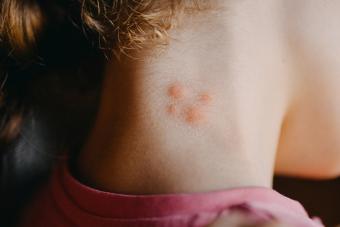
Many people get blackheads, at least once in a while. These unsightly black spots are a type of acne. Careful skin care can help prevent them from developing.
Types of Acne
Acne is the most common skin disease. No one knows exactly what causes it. In teenagers, it may be related to hormone changes. Pregnant women, and women starting or stopping birth control pills, may develop hormone-related acne, too.
Certain types of makeup and some medicines seem to bring on acne or make it worse. Genetics also play a role; if your mother or father had bad acne, you're likely to have problems with it, too. Pimples come in many types and sizes.
- Whiteheads, also called pustules, are classic pimples that are red at the bottom with white pus under a thin layer of skin.
- Papules are little bumps without any obvious pus.
- Nodules are large, painful bumps which feel solid.
- Cysts are also painful, and are large, deep, and filled with pus.
- Blackheads are pimples that are open to the air. They form when oil and dead skin cells clog a pore in the skin. Exposure to air causes the oil to turn dark brown or black. Both blackheads and whiteheads are called "comedones."
Getting Rid of Blackheads
Squeezing a blackhead will make it go away, at least temporarily, but it's not a good idea. Squeezing pushes out the dried oil and skin cells that are clogging the pore. Unfortunately, squeezing pimples can lead to infection and scarring. Occasionally a dermatologist will remove a blackhead using a special tool, but at home it's best not to pick or squeeze at all.
A better choice, for most people, is an over-the-counter medicine designed to treat acne. Products available include:
- Benzoyl Peroxide: This common medication is available in cream and gel form. It helps to kill a bacteria called Proprionibacterium acnes, which contributes to the formation of comedones. Benzoyl peroxide can cause dry skin.
- Salicylic Acid: This gentle acid helps to remove dead skin cells which can clog pores. It's a common ingredient in acne treatment creams and cleansing pads. Some people find that salicylic acid irritates their skin.
- Alcohol/Acetone combinations: Used together, these two treatments help to remove excess oil and keep Proprionibacterium acnes under control.
Treatment for Moderate or Severe Acne
When blackheads cover a large area of skin or are combined with pustules, nodules, and/or cysts, prescription treatment may help. A doctor may offer medicines including:
- Retinoids: Derived from Vitamin A, retinoids help to unclog pores so that comedones can't form.
- Antibiotic creams: Antibiotics placed directly on the skin can kill Proprionibacterium acnes and help pimples go away.
- Antibiotic pills: Erythromycin, doxycycline, and tetracycline can help to reduce the bumps of acne and keep them from returning.
- Oral contraceptives: Although in some women they can aggravate acne, in many women birth control pills can help clear up skin.
- Isotretinoin: A vitamin A derivative in pill form, Isotretinoin is used for very severe acne. It can cause serious birth defects, so women who take it must be extremely careful to avoid pregnancy.
Preventing Blackheads
Cleansing Skin
Keeping skin clean is the first step in preventing acne. That doesn't mean scrubbing or using harsh cleansers. Washing twice a day with gentle soap is enough.
Wash again after exercising or if your face gets dirty. Too-frequent washing and scrubbing can irritate skin and make it look worse.
What to Avoid
Some creams and makeup are more likely to clog pores than others. Avoid any makeups or creams which irritate your skin. Look for "noncomedogenic" makeup, which is specially formulated so that it will not contribute to acne.
If you get blackheads around your hairline, try using different haircare products. Stay away from pomades and hair gels.
Food
Many people believe that certain foods, such as chocolate, cause blackheads and other kinds of pimples. Doctors haven't found any proof that this is true. Still, if a certain food seems to trigger acne for you, it's worth trying to avoid that food to see if it makes a difference.
Staying On Top of Breakouts
Become familiar with your skin by giving it regular self-examinations in areas prone to developing these black bumps. If you think your blackheads are caused by or worsened by certain foods, limit your intake to determine if it makes a difference. Finally, monitor how your skin responds to new skin products, makeup and detergents. With regular maintenance, you can cut down on the appearance of these unsightly blemishes.







